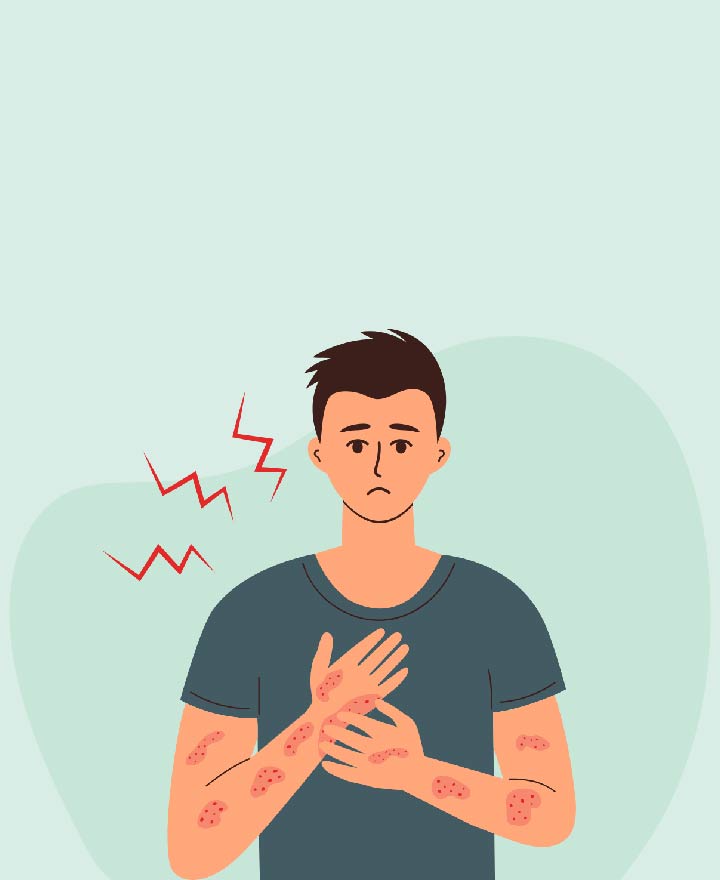

Psoriasis - Symptoms and Causes
Psoriasis is a serious skin disease where you experience painful and severe rashes which happen due to an autoimmune condition. While the disease is incurable, its symptoms can be managed. Read on to know more.
What is Psoriasis?
While psoriasis symptoms vary from person to person, there are some standard features that are usually observed. These include:
● Rashes with a patchy appearance which can either be small, dandruff-like dots on a small area of the skin, or large patches all over the body.
● The rash colour may be brownish with silver scales or dark purple with rough scabs.
● Small scabs or bumps.
● Cracked skin which may or may not bleed.
● Cracked and uneven fingernail tips.
Causes
The psoriasis cause is not clearly known. However, it is believed to be an immune system disorder where the healthy skin cells of the body are attacked by the immune system. The disease can also be triggered by:
● Family history of psoriasis
● Certain infections like strep throat
● A dry and harsh weather
● Skin injury
● Smoking and excessive alcohol consumption may trigger psoriasis and even make it worse for those who already have it
● Long-term exposure to certain drugs
Complications
Psoriasis can lead to certain complications which are:
● It can lead to psoriatic arthritis which causes severe pain and stiffness in various body joints
● Temporary or permanent changes to skin colour and tone
● It can lead to secondary health issues such as hypertension and type 2 diabetes
● It can cause excessive weight gain leading to obesity
● A patient with psoriasis may develop certain cardiovascular disorders over time
● Experiencing mental health issues such as low self-worth and depression
When should you visit a doctor?
Though this condition is incurable, the doctor can diagnose psoriasis with early symptoms. So if you experience any of the above mentioned symptoms, consult a medical practitioner immediately.
Depending on symptoms and its severity, the doctor may prescribe you necessary medication to bring relief and to stop the disease from spreading further.
Conclusion
It is very important to understand the psoriasis symptoms and take proper action as a person suffering from psoriasis faces a lot of physical and mental discomfort. Though the disease isn't contagious, it still requires a medical intervention.
One of the important components of our overall wellness is also being financially secured. Healthcare emergencies can happen any time, but a good health insurance can protect you from such uncertain situations. To know more about it, click here
Source: MayoClinic, Healthline, WebMD
Disclaimer: This blog provides general information and discussions about health and related subjects. The information and other content provided in this blog, website or in any linked materials are not intended and should not be considered, or used as a substitute for, medical advice, diagnosis or treatment. Kindly contact your Doctor before starting a new medicine or health regime.
Related Articles
The Best Ways to Prevent Infections
Ten Tips to Protect Your Eyes in Eye Injury Prevention Month
Tips to Keep Your Lungs Healthy and Whole
Healthier Aging - The Role of Functional Ability
A Guide To Healthy Teeth And Gums For Adults And Children
Published on January 12, 2023

















 Health Insurance
Health Insurance  Travel Insurance
Travel Insurance  Car Insurance
Car Insurance  Cyber Insurance
Cyber Insurance  Critical Illness Insurance
Critical Illness Insurance
 Pet Insurance
Pet Insurance
 Bike/Two Wheeler Insurance
Bike/Two Wheeler Insurance  Home Insurance
Home Insurance  Third Party Vehicle Ins.
Third Party Vehicle Ins.  Tractor Insurance
Tractor Insurance  Goods Carrying Vehicle Ins.
Goods Carrying Vehicle Ins.  Passenger Carrying Vehicle Ins.
Passenger Carrying Vehicle Ins.  Compulsory Personal Accident Insurance
Compulsory Personal Accident Insurance  Travel Insurance
Travel Insurance  Rural
Rural